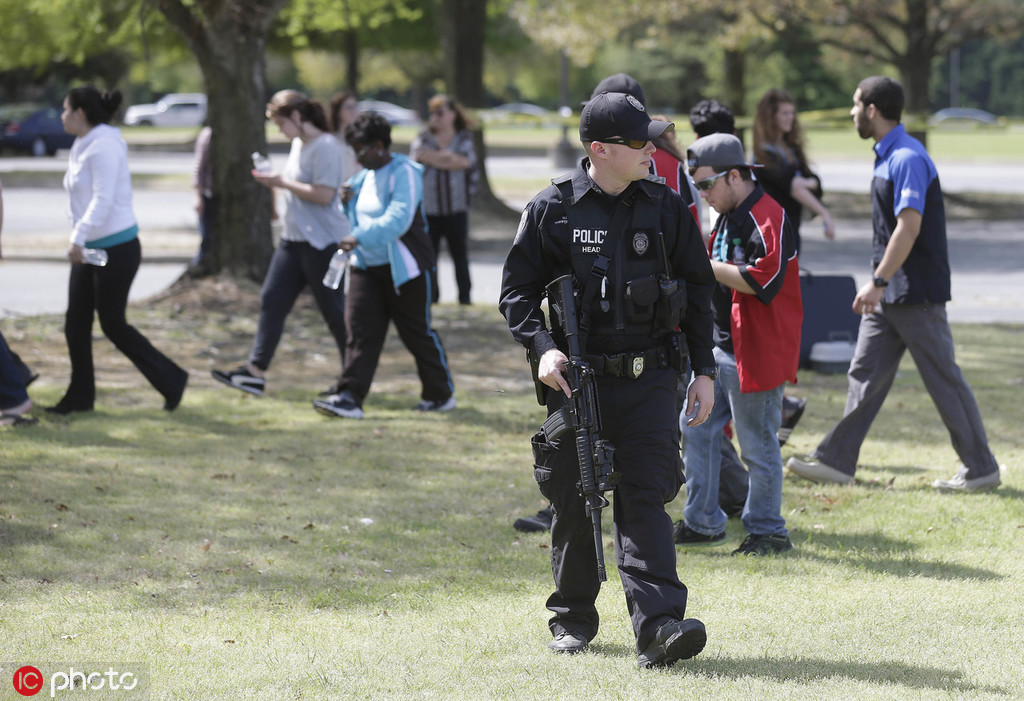Armed cops on US colleges rising trend


While forces in larger schools stay level, most increases seen are among smaller two-year colleges
More colleges in the US are using armed police to patrol their campuses, according to experts and statistics.
Last week, Maryland's lawmakers gave overwhelming approval for Baltimore-based Johns Hopkins University to put a 100-member armed police force on its three campuses, making it the state's first private university with armed officers.
Police forces on US college campuses didn't become widespread and fully professionalized until the 1960s, when colleges shaken by protests decided to have their own police instead of relying on local law enforcement. Now at least 44 states have laws allowing colleges to form a police force.
About 75 percent of the country's public four-year colleges and universities with more than 2,500 students have armed police, as well as 91 percent of private colleges of that size, according to a 2015 report from the US Justice Department.
A survey by the Bureau of Justice survey — the United States' primary source for criminal justice statistics and part of the Justice Department — found that campus police officers had patrol and arrest jurisdictions in areas next to campuses at 81 percent of colleges.
"This is certainly an ongoing trend across the country, for not only secondary middle schools and high schools, but also colleges and universities," Ronald Stephens, executive director of the National School Safety Council, told China Daily.
He said violence in K-12 grades in recent years has caused colleges and universities to consider having trained police officers on campuses.
"Large shootings [in schools] have really changed the mindset of the public," Stephens said. "Because it used to be considered if you had a police officer in the school, 'What's wrong with the school?'''
The number of police officers on campuses has grown, agreed Sue Riseling, executive director of the International Association of Campus Law Enforcement Administrators.
She told the Chronicle of Higher Education in May 2018 that she suspects that the growth isn't coming so much from large campuses, where she said the number of officers is generally stable, as from two-year institutions, which are adding more traditional officers to their ranks.
"It's probably the ones that are going from a handful to a maybe 24/7 presence," Riseling said.
Experts say that armed police officers on campuses should be specially trained and know how to deal with students properly.
"It's not just about having a warm body on the campus, but the real key is how these individuals are trained and prepared to deal with crises and things like de-escalation of incidents," Stephens said.
He said that adding an armed police officer should also create a climate of trust and build relationships with students, besides just going on the campus with a gun to create peace and tranquility.
Stephens said schools should also train students to better react to threats and rumors in assisting campus police offices.
"It's important for students to realize how much it's in their self-interest to report rumors and threats," Stephens said, adding that protocols need to be in place in places where students can notify school officials or law enforcers of any concerns that they have.
"And that's one of the reasons why the officer on campus is not just a cop, but as a resource that students can report and talk to," he said.
"If there is a sworn certified police officer, they need to be armed in order to protect the people that they're serving — whether it's on a college campus or a high school campus," Mo Canady, executive director of the National Association of School Resource Officers, told China Daily.
Officials at Johns Hopkins fought for the armed police force after lawmakers in the previous legislative session backed off the school's request amid a community backlash.
They said the force was needed to help ensure safety after a spate of robberies near its campuses in late 2017. Since 2015, Baltimore also has experienced unusually high violent crime levels, with four straight years of at least 300 homicides.
Opponents criticized the push for more police, saying that many city residents, particularly its large population of blacks, distrust law enforcement and worry about racial profiling. Critics also rejected allowing a private entity to operate a police force.
Supporters of armed police at the school included billionaire alumnus Michael Bloomberg, the former New York City mayor. Last year he announced he was giving $1.8 billion to Hopkins.
Bloomberg cited Baltimore's murder rate and said it was "irrational" for Hopkins not to have the same security as similar schools, especially given its large number of employees. Hopkins employs nearly 45,000 workers in Baltimore, making it the city's largest employer.
A group of Hopkins students called Students Against Private Police (SAPP) criticized Bloomberg's remarks. The group said Bloomberg's support for a private, armed police force was at odds with his other work to promote gun control.
"Johns Hopkins rightly expresses concern about the physical, social and economic well-being of the city in which we live, but it is inconceivable to us that a private police force run by the university to patrol the neighboring communities would improve these relations. We strongly oppose this highly undemocratic proposal," said an open letter signed by nearly 100 faculty members.
The state Senate voted 42-2 to approve Hopkins' request. One change in the school's request requires Hopkins to get approval from a majority of community members in off-campus areas before the Hopkins department can patrol there.

































